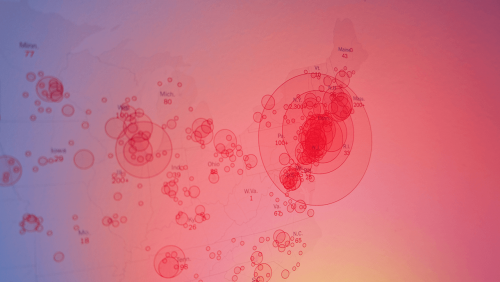As Countries Reopen, Publics Concerned About Possible Second Wave

An update on global public opinion on the COVID-19 pandemic reviews survey results from countries in North America, Europe, and Asia.
Global Public Opinion and the Coronavirus Weekly Update
As the coronavirus continues to spread globally, the world this week passed the 6.3 million case mark, with over 380,000 deaths attributed to COVID-19 so far. As nations attempt to return to normalcy, many remain concerned about the possibility of a second wave of infections as businesses and schools reopen. Moreover, a wave of protests in major cities across the world threatens to cause a spike in cases as thousands take to the streets.
Key Findings
- As France moves to reopen further, French people are largely supportive of the loosened restrictions, although there are signs of skepticism around the reopening of schools.
- A senior aide of Boris Johnson was caught breaking lockdown restrictions which led to accusations of double standards, and Boris Johnson’s approval rating has dropped nearly 20 points in the last month and a half to 37 percent.
- While the US and Japan have experienced the coronavirus pandemic at very different scales, publics in both countries are concerned about a second wave of infections.
- In South Korea, the emergence of new clusters has increased concern about the virus, but approval of the government’s response also increased 12 percentage points from the previous month to 85 percent.
- While Italian President Sergio Mattarella has urged Italians to be more united in the wake of the COVID-19 outbreak, 63 percent of Italians do not believe that the crisis will lead to more unity.
North America
United States
The nation has been rocked this week by nationwide protests in nearly every US city over the death of George Floyd at the hands of Minneapolis police officers on May 25. Though health officials warn that these large gatherings may lead to the spread of the coronavirus, these protests are notably more popular than earlier anti-lockdown protests. A June 1 Morning Consult poll finds that 54 percent of Americans support demonstrations in response to Floyd’s death, compared with 28 percent who support "Reopen America" protests.
As the coronavirus has spread across the country, more Americans now know someone who has been diagnosed with the virus: 42 percent now say this, up from 11 percent in late March, according to a May 25-28 ABC News/Washington Post poll. A May 20-21 ABC News/Ipsos poll finds that fifteen percent of Americans say they personally know someone who has died from the virus. That death toll has come with sharp racial disparities, and that is reflected in the polling as well. Ipsos reports that three in ten black Americans (30%) know someone who has died of the coronavirus, compared to one in ten white Americans.
As states across the country pursue different strategies and timings of economic reopening, ABC/Washington Post polling finds that a majority of Americans (57%) say it is more important to control the spread of the coronavirus, even if it hurts the economy, while 37 percent say it is more important to try to restart the economy, even if it hurts efforts to control the spread of the virus. A similar majority (58%) also say it is too early to go back to public places like store and restaurants, though four in ten Americans (40%) are willing to go back to the way things were before the outbreak.
At the same time as Americans remain concerned about the spread of the disease, the economic impact also weighs heavily on the public mind. Six in ten (59%) say the economic impacts of the outbreak on their community have been severe, up from 43 percent who said the same in late March. A majority (58%) say that the increased unemployment benefits legislated by Congress should be extended beyond July, while one-third (35%) say they should end. The looting that has accompanied some protests is adding complications to the economic reopening plans of many cities and states, with businesses already closed for weeks by health restrictions now face rebuilding and restocking.
And looking forward, Americans remain concerned about future outbreaks: two-thirds (68%) say they are worried about a second wave of coronavirus infections in the fall.
Europe
Italy
As new cases and deaths throughout Italy continue to decrease, restrictions on interregional travel are being rolled back. Beginning on June 3, Italians will be able to leave their regions of residence and travel to other regions within the country. According to an Ixè report from May 26, most Italians (56%) are favorable to this change on the condition that regions most at risk remain closed. At the same time, 17 percent of Italians say they are completely opposed to the idea of reopening travel between regions, stating that it is still too soon to allow these kinds of movements. One-quarter (23%) of Italians say the country is ready to open up travel without restrictions.
The loosening of restrictions in Italy raises questions of how the country will move forward. As Italy celebrates Republic Day, President Sergio Mattarella urged Italian citizens to let the COVID-19 pandemic bring unity to the country. In a speech addressed to the nation on June 1 he said that in times of crisis, the only way forward is together and appealed to citizens to put “moral unity” before politics. Despite this, findings show that Italians are not hopeful the pandemic will unify the nation. According to an Ipsos report from May 26, 63 percent of Italians think the crisis will not have any effect on national cohesion.
The United Kingdom
In the United Kingdom, Prime Minister Boris Johnson is facing a steep drop in his perceived ability to manage the COVID-19 crisis. According to a May 27 poll by Redfield and Wilton, on April 14, 59 percent said they strongly approve or approve of his management of the crisis. That fell to 37 percent on May 27.
The cause of this drop came as one of Johnson’s senior aides—Dominic Cummings—broke the travel restrictions to travel between his residences in London and Durham. Mr. Cummings has not expressed culpability for his actions and Johnson has defended him, leading to accusations of double standards by the government. 73 percent of Britons think that he broke the rules of the lockdown measures, and 79 percent say his justification for doing so—which was to ‘test his vision’—was not valid.
Meanwhile, as children returned to school on June 1, many teachers criticized the push to open schools one month before summer break, citing space constraints and safety concerns. An Ipsos survey conducted May 20-22 found that if its deemed impossible to create a vaccine for the virus, 62 percent of Britons think it would be completely acceptable or acceptable for parents to be able to choose whether to send their children to school or not. Conversely, a plurality of British respondents (45%) think it would be completely unacceptable or unacceptable for the government to dictate when parents must send their children back to school.
Japan
The COVID-19 pandemic that sent Japan into a nationwide state of emergency is beginning to ease. The government lifted the state of emergency fully on May 25, a bit over a month after the initial state of emergency declaration went into effect in Tokyo. Kyodo polling conducted May 29-31 finds that a plurality (47%) say this was done too quickly, while 39 percent say the timing was appropriate (8 percent say it was too slow). And while approval of the government’s response to the coronavirus is rising (40%, up from 34% in a May 8-10 poll), majority opinion remains negative (53%, down from 58%).
While the pandemic situation is improving, it has not been to Prime Minister Abe’s benefit, as he has been dogged by a scandal involving the former chief of the Tokyo High Public Prosecutor’s office as well as by criticisms of the government response. Three-quarters (77%) say that the government has not made sufficient use of the nation’s PCR testing capabilities. And eight in ten (81%) say that the government’s direct aid of 100,000 yen payments to residents of Japan have been too slow. Critiques of slow aid are boosted by the widespread concerns about the economic effects of the pandemic. A May 30-31 Sankei poll finds that two-thirds (68%) are very concerned about the effects of the pandemic on Japan’s economy.
The Japanese public remains concerned about the effects of the pandemic on their everyday lives, with eight in ten (82%) saying they feel at least somewhat worried. That concern is a bit less intense than it was in early May, with fewer now saying they are outright worried (30%, down from 37%) and more Japanese saying they are somewhat worried (52%, vs. 48%). One factor contributing to this anxiety is the prospect of future outbreaks. Six in ten Japanese (61%) are worried that there will be a second wave of coronavirus infections, with another third (35%) somewhat worried about the possibility.
France
On Thursday, May 28, Prime Minister Edouard Phillipe explained the details of Phase 2 of deconfinement which will begin on June 2 in most French departments. This change comes three weeks after France began its process of deconfinement. For 'green' departments in Phase 2, parcs and gardens, as well as restaurants, bars, and schools will reopen to the public. An Odoxa survey which asked the French public about Phillipe’s speech said that he was clear (74%), he knew what he was doing (64%), and he told the truth to the French people (60%).
Moreover, a slight majority of French people think the schedule of deconfinement is well planned, with 55 percent saying it is happening neither too fast nor too slow.
The French public is largely in favor of all the restrictions that will be loosened. However, the move to reopen elementary and middle schools has the lowest support (56%) compared to 88 percent that support the reopening of parks and gardens throughout the entirety of France.
Despite approval of this new stage of deconfinement, the French people are opposed to the use of a contact tracing app that the French government has proposed. Asked if they would be ready to use this application to fight against the pandemic, 55 percent said certainly not or probably not.
Asia
South Korea
As of May 28, South Korea has 11,344 reported cases and 269 deaths. With cases declining and increasing optimism to restart normal activities, the South Korean government began to re-open parts of the country.
However, those plans have been delayed due to new clusters resulting from a second outbreak in early May. South Korea experienced 79 new cases on May 27, the highest number in a month and a half. New clusters have raised concerns among the public, reversing the optimism from early May.
Recent Gallup Korea polling shows 67 percent remain concerned about the virus, the highest mark since the latter half of March and a 12 percent increase from the last poll conducted two weeks ago (55%). Additionally, 53 percent believe they can contract the virus, an 8 percent increase from the last poll (45%).
Despite the increase in public fears, approval in the government response to the coronavirus has increased. Gallup polls show 85 percent believe the government response has been good, a 12 percent increase from the last poll conducted a month ago (73%).





